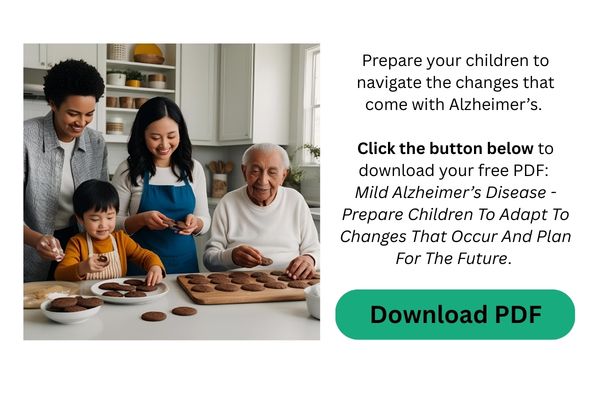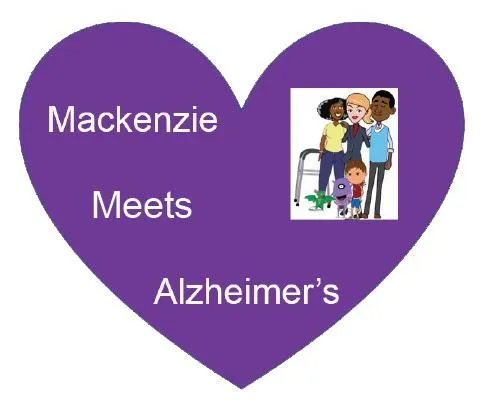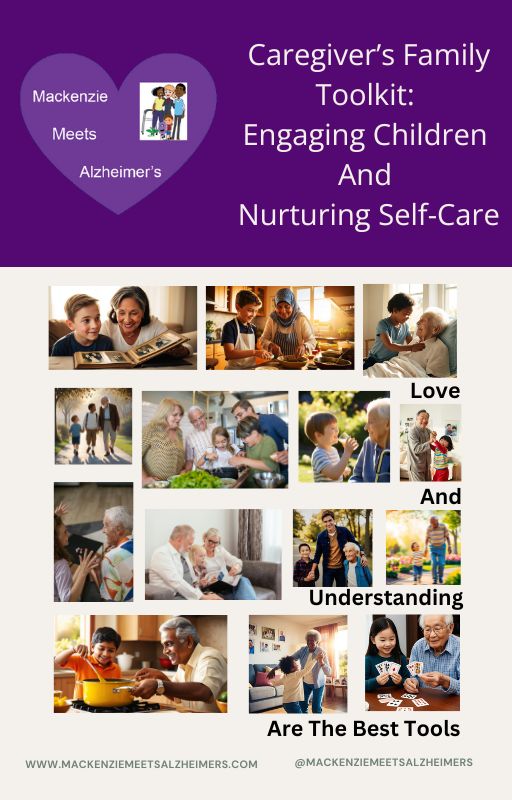
Navigating Mild Alzheimer's Disease: A Guide for Sandwich Generation Caregivers
Lily loved Saturdays. That’s when she baked cookies with Grandpa. They mixed, stirred, and told silly stories.
But one day, Grandpa forgot the recipe. He even called Lily by her mom’s name.
“Mom,” Lily said, “Why is Grandpa acting funny?”
Mom gave her a hug. “Grandpa has something called Alzheimer’s. It makes his brain forget things. But he still loves you very much.”
“Can I help him?”
“Yes,” said Mom. “Keep baking with him. Use easy recipes and make sure the oven gets turned off. If you need help, just ask me.”
So Lily made recipe cards with big pictures and simple steps.
“Let’s try this one, Grandpa!” she said.
They stirred the dough. Flour flew everywhere! Grandpa laughed. “Remember when we made that giant burnt cookie?”
Lily giggled. “You said it was your favorite!”
As time passed, Grandpa needed more help. Lily did more of the baking, and Grandpa did more of the tasting.
But every cookie they made brought smiles, hugs, and happy memories—one sweet bite at a time.
Here's a video about Mild Alzheimer's Disease.
Balancing the needs of both an aging parent with Alzheimer's and a young child can feel overwhelming. Are you a caregiver caught in the sandwich generation, wondering how to manage the unpredictable journey of a loved one newly diagnosed with mild Alzheimer's disease while still nurturing your child? If so, you're not alone. This post offers practical solutions to help you navigate this dual caregiving role effectively.

Understanding Mild Alzheimer's Disease
Mild Alzheimer's disease is the early stage of the condition where symptoms begin to manifest, but are often mistaken for normal aging. It's crucial to recognize these early signs such as slight memory lapses, losing track of time, or struggling with familiar tasks. Educating yourself on these symptoms can enable you to provide better care and prepare for future changes.
Our Mackenzie Meets Alzheimer's Awareness Program (MMAAP) has a video designed for children called Mild Stage Alzheimer's Disease. Learn more about the MMAAP here.
Behavioral Changes and Coping Strategies
As Alzheimer's progresses, behavioral changes can emerge including mood swings, confusion, and potentially accusatory behavior. It's essential to approach these changes with compassion and patience. Encouraging open communication and creating a structured daily routine can ease these transitions for everyone involved.
Preparing for the Future
Proactive planning is key in managing Alzheimer's. Discussions about legal, financial, and healthcare wishes should happen early, involving all family members. Doing so, not only prepares you but also ensures the wishes of your loved one are respected.
Incorporating Children into the Care Process
Children can be surprisingly resilient and empathetic when included in caregiving. Educate your child about Alzheimer's in an age-appropriate manner to help them understand their grandparent's behavior, or parent's behavior if the adult has younger-onset dementia. Get our free 'Caregiver's Family Toolkit: Engaging Children And Nurturing Self-Care' here, where we help you describe Alzheimer's to three different age groups. Encouraging children to participate in simple caregiving tasks strengthens family bonds and provides them with a sense of responsibility and empathy.
Activity Suggestion:
Simplify any familiar activity. For example: If your loved one likes to bake, use pre-made dough for cookies and just slice and bake. Or if your loved one used to play chess and cannot remember the strategies or rules, switch to checkers. And remember, learning new activities can be frustrating so stick with familiar activities.
Download our PDF for more information, tips, and activities.
Concluding Thoughts
Taking care of a loved one with mild Alzheimer's disease while raising a child is a challenging yet enriching experience. By understanding the disease, preparing for future changes, and involving your children, you will create a nurturing environment for your family. Remember, you are not alone on this journey..
Ready to explore more about creating a nurturing environment for your child and your loved one with Alzheimer's or any type of dementia? Consider purchasing our Mackenzie Meets Alzheimer's Awareness Program. Learn more here.

